Mordecai Kaplan
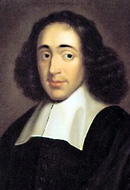 Secularism and Its Discontents
Secularism and Its DiscontentsThursday, May 30, 2013 by Yehudah Mirsky | Jewish Ideas Daily » Daily Features
In an essay first published December 17, 2010, Yehudah Mirsky examines a defense of Jewish secularism and finds it—and Jewish secularism itself—wanting.
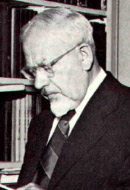 The Most Influential Jewish Philosopher You Never Heard Of
The Most Influential Jewish Philosopher You Never Heard OfMonday, November 12, 2012 by Diane Cole | Jewish Ideas Daily » Daily Features
Adapt or die: this principle now permeates discussions among not just biologists but anthropologists, sociologists, and even theologians seeking the origins of religion in an evolutionary need for group survival.
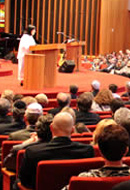 Can Reform Judaism Get Its Mojo Back?
Can Reform Judaism Get Its Mojo Back?Friday, November 9, 2012 by Evan Moffic | Jewish Ideas Daily » Daily Features
The American Jewish community as a whole cannot survive if there is no non-Orthodox movement to which American Jews can belong; in other words, survival depends on a strong Reform movement. But in light of current trends, is that possible?
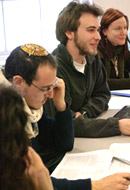 Reconstructing Judaism
Reconstructing JudaismWednesday, August 3, 2011 by Joseph J. Siev | Jewish Ideas Daily » Daily Features
At a time when all three major Jewish denominations in America—Orthodox, Conservative, and Reform—find themselves in a state of deep internal fracture, a fourth and much smaller movement, Reconstructionism, has just voted to create a unified body to coordinate the activities of its lay and rabbinical arms.
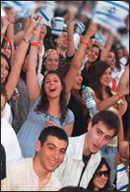 The Return of Peoplehood
The Return of PeoplehoodFriday, July 9, 2010 by Yehudah Mirsky | Jewish Ideas Daily » Daily Features
Among the various attempts over time to articulate a common, all-embracing sense of identity and direction for the Jews—that sprawling, fractious, and diverse group—the notion of peoplehood has been experiencing something of a revival. The Jewish Agency, for one, has announced that peoplehood will henceforth be the focus of its programming, and Israel will of course play a central role in this effort. But does a central role for Israel actually comport with the broadly inclusive tent that the "peoplehood" rubric seeks to establish? Some say no.
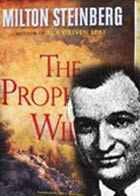 Milton Steinberg
Milton SteinbergA different sort of book launch took place yesterday at New York's Park Avenue Synagogue, a flagship of the Conservative movement. Being celebrated was the release of a long-lost novel left unfinished at the time of the author's death 60 years ago. The author was Milton Steinberg, who once served as the synagogue's rabbi and was among the most influential American Jews of the 20th century. Steinberg's early thought was molded by three teachers. At City College, the philosopher Morris Raphael Cohen imbued in him a commitment to philosophical rationalism. Rabbi Jacob Kohn taught him that the life of the...

